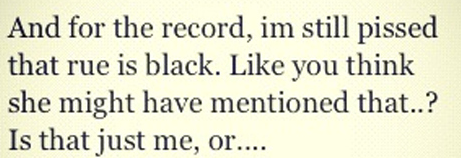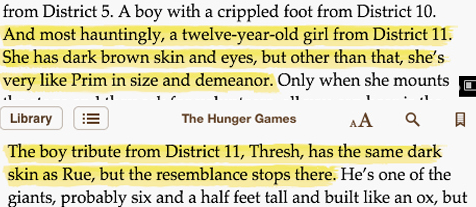Last week Andrew, Michael S., Will S., Katrin, and Tom Megginson all brought our attention to some of the racist tweets that appeared after the premiere of The Hunger Games. Apparently some viewers were shocked to find that some of their favorite characters from the books were played by African American actors (and some critics seem to have felt that Jennifer Lawrence didn’t look starved enough for her role). Buzzfeed and Jezebel posted some examples of the response to the African American characters:
In fact, Suzanne Collins did include descriptions that would seem to clue a reader in that they’re not supposed to assume that every character in the book is Caucasian (cropped from Buzzfeed):
But of course, the apparent lack of reading comprehension of many fans of the book is rather beside the point by now. What these reactions indicate is the invisibility of non-White people in pop culture, and the sense of distress, disappointment, and even outrage some can feel when they are expected to accept non-Whites in what they see as “neutral” roles. And, more disturbingly, it illustrates the degree to which the humanity of non-Whites can be erased, and highlights racialized associations. “Some black girl” is, by definition, not an “innocent girl.” It’s funny to say that the death of a character that touched you in the book is less moving if you imagine the character as African American. We’ve seen this type of reaction before, such as when Idris Elba was cast in Thor. Or the equally negative response to the suggestion that Donald Glover, an African American actor, should audition for the starring role in the newest Spider-Man remake, as Lindy West points out at Jezebel: “…it’s a proprietary thing-if Spider-Man is black, then he isn’t ours anymore. He’s theirs.”
I think the best discussion of the implications of the Hunger Games tweets comes from Anna Holmes, whose take was posted by The New Yorker. I’ll leave you with a quote and strongly suggest you go check out the full article:
Hunger Games Tweets—there are now more than two hundred up on the blog—illuminated long-standing racial biases and anxieties. The a-hundred-and-forty-character-long outbursts were microcosms of the ways in which the humanity of minorities is often denied and thwarted, and they underscored how infuriatingly conditional empathy can be…If the stories we tell ourselves about the future, however disturbing, don’t include black people; if readers of “The Hunger Games” are so blind as to skip over the author’s specific details and themes of appearance, race, and class, then what does it say about the stories we tell ourselves regarding the present?





